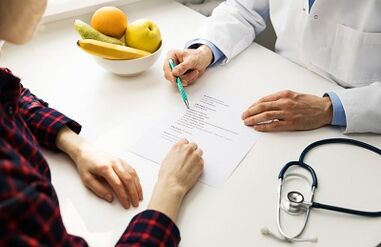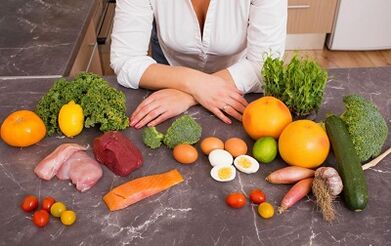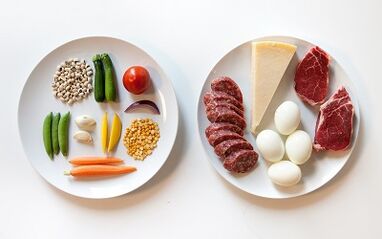
Gout is a disease that results in a violation of metabolism when an excessive amount of uric acid accumulates in the body.The salt of uric acid (sodium rurates) is placed in the joints, leading to their inflammation and other organs.
The risk zone contains people who use large amounts of meat, spicy foods that abuse alcoholic beverages.Other factors related to the development of the disease may include obesity, sedentary lifestyle, nervous stress, and inheritance.
Blood test for uric acid content is performed to confirm the diagnosis.When analyzing urine, the protein is diagnosed.
Gout most often affects joints near the thumb.In most cases, gout attack occurs at night or early in the morning.The acute period of the disease can take up to seven days.The disease is chronic, periodically repetitive relapses.
Over time, attacks are increasingly repeated, the disease affects new joints and the destroyer of the bones can occur.For more than four years, sick, dense, yellowish tubers have been formed under the joints for more than four years.From time to time, these formations can explode, and whitish crumbs stand out.
Gout complications can be kidney stones, hypertension, kidney colors, heart muscle and heart valve damage.
Diet with gout
The gout diet of the legs includes denial of purinal saturated foods.To reduce the content of uric acid, the body should be significantly restricted in the body.
Certain types of meat and fish, inner, yeast, caviar, mushrooms, legumes, chocolate should be excluded.50% of purines are released into the broth while cooking, so it is not recommended to use broths.This applies to all broth (meat, fish, mushrooms).Simple carbohydrates and saturated fats also pose a certain danger.

When treating gout, it is important to eat regularly, not starve and not exceeded.Fasting, like excessive nutrition, provokes the release of uric acid.In the presence of overweight, extremely sharp weight loss is undesirable.Foods should be fractionated, at least five meals daily.
We recommend that you organize fasting days, fruits and vegetables within a week.In the remaining days (2-3 times a week), the use of a small number of lean meat and fish products in cooked or fried form is completely excluded during the aggravation phase.
In the case of gout, sufficient amounts of fluid should be used, while canned carbonated drinks should be avoided.Alcohol is strictly prohibited at any dose, including low alcoholic beverages.It is recommended for alkaline mineral water, natural berries and fruit juices (especially citrus fruits), compotes and fruit drinks (especially blueberries and lingonberry), and lace beams.
Water prevents the formation of kidney stones.Sugar is not added to drinks as sugar increases blood insulin levels and slows down the selection of uric acid.Cocoa, strong tea, coffee are limited due to their effects on the nervous system.Drink at least 1 cup of liquid 4-5 times a day before meals, the amount of fluid consumed should be 2.5-3 liters daily.
This diet should be continuously followed if the diet becomes stricter in the event of aggravations.
A list of forbidden products
- Pork, fat;Parts of young animals and animals that give adhesive soup (legs, cartilage, head);
- Broth (meat, fish, mushrooms), meat sauce, cold weather;
- Meat extracts (soups from the package);
- Meat smoked meats;
- Internal (liver, heart, kidneys, brain) and foods from stores;
- Fat types of fish, salty and fried fish (with aggravation);caviar;Canned fish (sardine, sprat, sprats);
- Salt and sharp cheeses;
- Legumes (peas, beans, lentils, beans, soy);
- Cream, fermentation, yogurt;
- Spices and spices (mustard, horseradish, pepper, ketchup, tomato compastation), with the exception of vinegar and bay leaf;
- Chocolate, cakes, cakes;
- Culinary and other animal fats;
- Raspberries, figs, grapes and all vineyards (raisins, wine);
- Hot and puff pastry products;
- Products containing preservatives.
A list of products whose contents in diet should be restricted

- Salt;
- Sausage;
- Cooked meat and fish.Preference should be given to poultry, salmon, salmon, trout.Contain unsaturated fatty acids that are needed for metabolism of fats);
- Cauliflower, beet, dude, spinach, asparagus, rhubarb, celery, parsley, green onions, peppers, radish, radish, turnibet, tomatoes;plum;
- Mushrooms (white, cargo, champagne);
- Butter;
- Salting and marinades;
- Strong tea, coffee, cocoa.
In addition to aggravation, lean meat and fish can be inserted 2-3 times a week in the menu cooked and steamed form.Slices, meatballs, cheeks are made from cooked meat or fish.Meat, fish, vegetables can be cooked or baked.From time to time, it is advisable to perform short -term monodites or fasting days: vegetables, fruits (1.5 kg vegetables or fruit daily), cottage cheese (400 gr. Curd and 500 ml kefir).The unloading day of the rice apple is useful: 75 gr.The rice is boiled in 750 ml of milk and 250 gr.Apples without sugar (in the form of a compote).Rice and apples are consumed in three portions during the day.
During the aggravations, the meat and fish are completely excluded, and the days of fasting are arranged every other days.This alkalizes urine and increases uric acid strength.
Recommended for consumption products
- Chicken, Turkey, Rabbit;
- Low fatty fish, seafood: squid, shrimp;
- Sour -milk products: kefir, cottage cheese, low greasy sour cream;
- Milk, added to cereals and drinks;
- Egg, chicken and quail (in any culinary processing, except for baking), omelette;
- Bread made of coarse flour, wheat and rye;
- Cereals, pasta (moderately);
- Nuts (peanuts, cedar, almond, pistachio), seeds;
- Any dried fruit (except for raisins), honey;
- Vegetables: white cabbage, cucumbers, zucchini, carrots, potatoes, eggplant, dill;freshly made vegetables (zucchini, eggplants);
- Fruits: green apples, pears, citrus fruits, peach, peach, berries (except for raspberries), avocado, pineapple, watermelon;
- From sweets: marshmallow, jam, pastille, jam;
- From beverages: lemon tea, green tea, coffee with milk, lace overe decoction, fruit and vegetable juices, fruit drinks, compotes, kvass, mineral water;
- Vegetable oil (olive, canvas).
First you can make vegetarian soups: Borsch, cabbage soup, okroshka, peasant soup (potatoes and cereals), milk soup.
Only fluid is recommended when the disease is aggravated in early times and then switching to the milk diet.
























